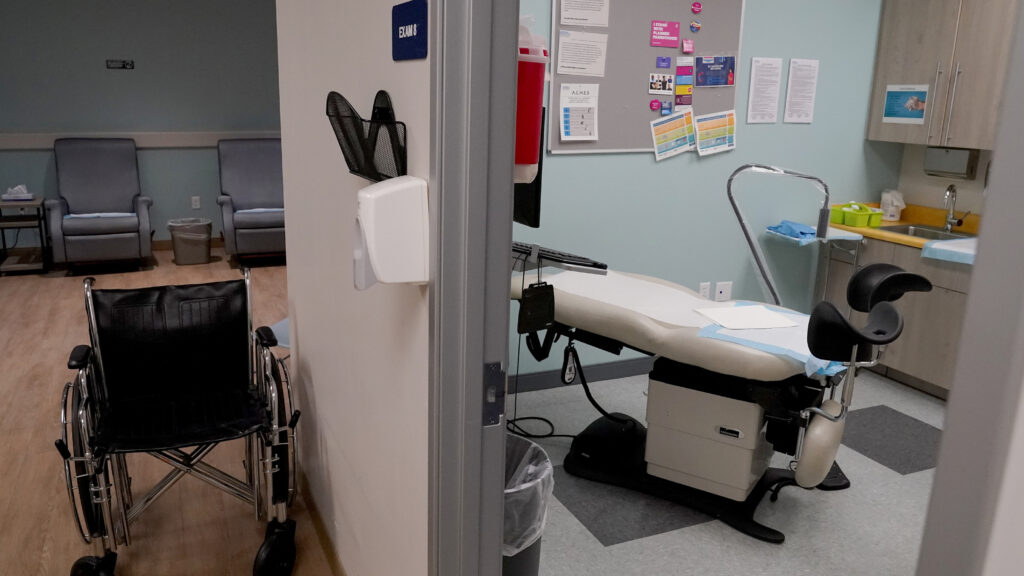WASHINGTON — Advocates made a huge push to protect abortion rights at the state level in Tuesday’s elections, but a series of notable defeats and another Trump presidency leave abortion rights advocates dealing with their biggest setbacks since the Supreme Court upheld Roe v. Wade destroyed.
After the biggest push for abortion rights since the 2022 Supreme Court ruling, the mixed results leave the country a patchwork of bans, restrictions and safe havens for the procedure. Florida rejected a ballot initiative that would have rolled back a six-week abortion ban and expanded access through a fetus’s viability, or about 24 weeks. South Dakota also rejected a ballot measure that would have protected abortion in the first trimester of pregnancy.
Nebraska had two competing measures on the ballot: one to protect access to abortion until the viability of the fetus, and another to enshrine the state’s current 12-week ban in the state constitution. The twelve-week ban won.
A total of 10 states voted this year to codify abortion access in their constitutions, restoring Roe-era protections and, in some cases, overturning current bans. Abortion rights advocates also counted victories in other states: Missouri largely rejected the current abortion ban. Arizonans and Montanans voted to enshrine abortion rights up to the viability of the fetus. Voters in Democratic strongholds Colorado, Maryland and New York approved broader protections.
However, this year’s voting results are a departure from the broad previous victories of abortion rights advocates in the 2022 and 2023 elections and, with the Republican Party in control of Washington, could herald a new era in the post- Roe fight for access to abortion. In the first elections after the fall of Roe, five states voted in favor of abortion rights or rejected certain restrictions. Ohio also passed protections last year.
“Opposition [to abortion rights] is becoming increasingly aggressive and extremely well funded,” said Noreen Farrell, executive director of Equal Rights Advocates. Florida’s difficult 60% threshold for passage is also a tactic that advocates expect other state lawmakers to move to fend off future ballot measures.
But Farrell added: “The momentum from seven more states is significant, and we hope it will act as a deterrent to new federal elected officials considering a national abortion ban.” At least one newly elected senator, Republican Bernie Moreno of Ohio, has called for a national ban.
While Trump and other Republicans have retreated from national abortion restrictions this election cycle, the new abortion restrictions could embolden those who rise to power — especially new lawmakers who defeated Democrats who had made abortion rights central to their campaigns.
The results of the Florida measure are a “HUGE victory” for anti-abortion advocates, former White House press secretary Kayleigh McEnany wrote on Trump’s website. social platform.
Most Americans say abortion should be legal, especially in the first trimester, and the majority disagrees of the Supreme Court’s decision to overturn Roe. Notably, these numbers have led Republican candidates to back away from previous promises to further restrict access to abortion and even impose national restrictions.
Still, support for abortion rights is waning as Americans are asked about access to the procedure in the second and third trimesters. Six of the states’ ballot measures asked voters to protect access to abortion until the viability of the fetus, typically around 24 weeks of pregnancy.
In at least three states, Arizona, Florida and Montana, the vote will lead to parallel crucial races for control of the US Senate.
Florida Sen. Rick Scott fended off Democratic challenger Debbie Mucarsel-Powell, giving Republicans a major victory in their bid to regain the Senate. Scott is among the Republican senators vying to replace Mitch McConnell as Republican leader. Reproduction rights were a key part of Mucarsel-Powell’s campaign, and Florida was one of the few states that Senate Majority Leader Chuck Schumer (D-N.Y.) hoped would flip to keep the Senate in Democrats’ hands.
Democratic incumbent Jon Tester lost his Senate seat to Republican Tim Sheehy after also pushing heavily on abortion rights. Sheehy has said he is firmly against abortion and compared the procedure to it murder.
Failed efforts in Florida, Nebraska and South Dakota leave abortion rights advocates facing battles with state lawmakers and governors. While voters may create new ballot initiatives in future election cycles, lawmakers are getting in on the action several of these states trying to make it harder to successfully put a measure before voters, or for it to win.
Trump’s re-election “raises new and serious concerns” about the safety of reproductive health care, Daniel Grossman, a gynecologist and director of Advancing New Standards in Reproductive Health, said in a statement. The election results are a “major setback for science-based medical care in a country where many already live in reproductive health deserts.”
The broader opportunity to put reproductive rights policies directly to voters in other states is also shrinking: they’re just there three remaining states with mechanisms in their constitutions to allow voters to organize ballot measures that the legislature and governor can override. Two of those states, Arkansas and Oklahoma, have broad abortion bans. A judge recently lifted the ban in the third state, North Dakota. Many of the states with a total abortion ban have no opportunity for voter-proposed amendments.

